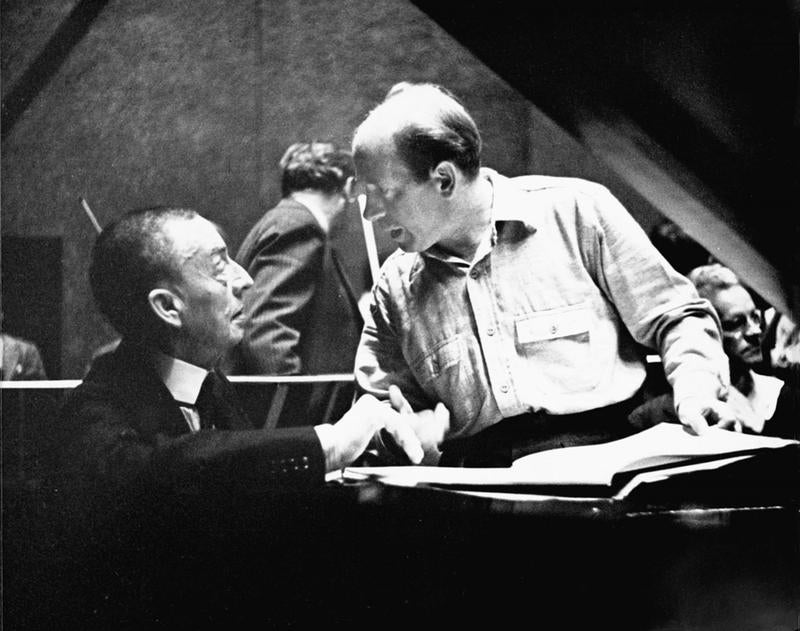Celebrating the Rediscovery of a Historic Recording

PRESS CONTACTS
Monica Fonorow, University of Pennsylvania Libraries
mfonorow@upenn.edu, 215.746.7769
Ashley Berke, Philadelphia Orchestra
aberke@philorch.org, 215.893.1939
On Friday, January 31, the Penn Libraries and The Philadelphia Orchestra will come together for a special presentation exploring the only known recording of composer and pianist Sergei Rachmaninoff playing his last major orchestral work, Symphonic Dances.
Philadelphia Orchestra leaders Matías Tarnopolsky (President and CEO) and Yannick Nézet-Séguin (Music Director) will open the event with a conversation about the piece and its context in the orchestra’s history. Ward Marston, cofounder of Marston Records, will recount the history, discovery, and restoration of the recording found at the Penn Libraries. Then two pianists on the faculty of Swarthmore College, Andrew Hauze and Marcantonio Barone, will bring the evening to a close with a performance of Rachmaninoff’s two-piano arrangement of the Symphonic Dances.
“This collaboration brings new life to a historic recording,” says Constantia Constantinou, H. Carton Rogers III Vice Provost and Director of the Penn Libraries. “When we collect and preserve rare and precious items, we contribute to knowledge. But through collaboration with researchers and others who are experts in their fields, we build partnerships that inspire creative expression and truly advance knowledge for good.” An accomplished classical guitarist, Constantinou earned a bachelor’s in music and a master’s in music theory from the Aaron Copland School of Music at Queens College of the City University of New York (CUNY), and stayed at Queens to earn her master’s in library science.
The Rachmaninoff recording is particularly notable because the Russian-born musician famously refused to allow any recordings or broadcasts of his live performances—and as a result, his public persona was restricted for decades to what listeners could glean from his poised, impeccable recordings through RCA Records. Then, in 2007, a researcher found an intriguing listing in the Penn Libraries catalog and shared it with producer Ward Marston. On listening to it, Marston realized they’d uncovered a long-hidden gem: a private recording of Rachmaninoff playing his symphonic work on the piano, shedding new light and nuance onto the composer’s artistic legacy.
“When we realized it was a recording of Rachmaninoff playing his last orchestral work on piano, we knew we had come across something special,” says Dick Griscom, who was serving as the director of the Otto E. Albrecht Music Library at the University of Pennsylvania when the recording reemerged.
Recognizing the recording’s significance, Marston restored it, digitized it, and released it on his label in 2018, in a production that the Wall Street Journal called “one of the most searing listening experiences in the history of recorded sound.”
The 1940 recording captures Rachmaninoff’s solo run-through of the work for Eugene Ormandy, then the music director of The Philadelphia Orchestra, just weeks before the orchestra premiered the piece.
“Rachmaninoff had deep ties to The Philadelphia Orchestra, and even said that when he composed, he did so with the sound of the Orchestra in his mind,” said Philadelphia Orchestra President and CEO Matías Tarnopolsky. “Through invaluable scholarship, Penn Libraries has unearthed this musical gem, which gives us new insights into one of the Rachmaninoff's most beloved works—premiered by the Orchestra, and the only piece he wrote in the United States—and sheds light on the unique relationship he shared with Eugene Ormandy and The Philadelphia Orchestra.”
The recording is part of the Ormandy Collection at the University of Pennsylvania Libraries, which includes music scores; papers and correspondence; programs; photographs; recordings; oral histories; and audiovisual material. The collection, documenting Ormandy's extraordinary 64-year career, was donated to the University of Pennsylvania Libraries in 1987 by Mrs. Margaret Ormandy.
View and download high-resolution images and audio clip: https://upenn.box.com/s/2k70ngs1rppt6ogrzqzzdg4ghtn2238v
For more information about the event, visit library.upenn.edu. Registration is currently full. Waitlist requests can be submitted online. The program will also be livestreamed on Facebook starting at 6:15 p.m. on Friday, January 31.
About the Penn Libraries
The Penn Libraries provides a network of information resources and knowledge services that are vital to teaching, research, and learning at the University of Pennsylvania. This network includes 14 physical libraries, recognized for their collections, and a digital library known for innovation and richness of content. Through exhibitions and lectures, and through the acquisition and preservation of literary and artistic artifacts, the Penn Libraries documents a wealth of social and historical periods, bringing scholarship to life at the University and in the various communities it serves. For more information on the Penn Libraries, please visit library.upenn.edu.
About The Philadelphia Orchestra
The Philadelphia Orchestra is one of the preeminent orchestras in the world, renowned for its distinctive sound, desired for its keen ability to capture the hearts and imaginations of audiences, and admired for a legacy of innovation in music-making. The Orchestra is inspiring the future and transforming its rich tradition of achievement, sustaining the highest level of artistic quality, but also challenging—and exceeding—that level, by creating powerful musical experiences for audiences at home and around the world. Music Director Yannick Nézet-Séguin leads The Philadelphia Orchestra at least through the 2025-26 season, an extraordinary and significant long-term commitment. His highly collaborative style, deeply rooted musical curiosity, and boundless enthusiasm, paired with a fresh approach to orchestral programming, have been heralded by critics and audiences alike. The Orchestra’s numerous education initiatives are an important focus of the organization’s offerings, as the ensemble engages audiences beyond the stage and into the community. For more information on The Philadelphia Orchestra, please visit www.philorch.org.
Date
January 16, 2020
